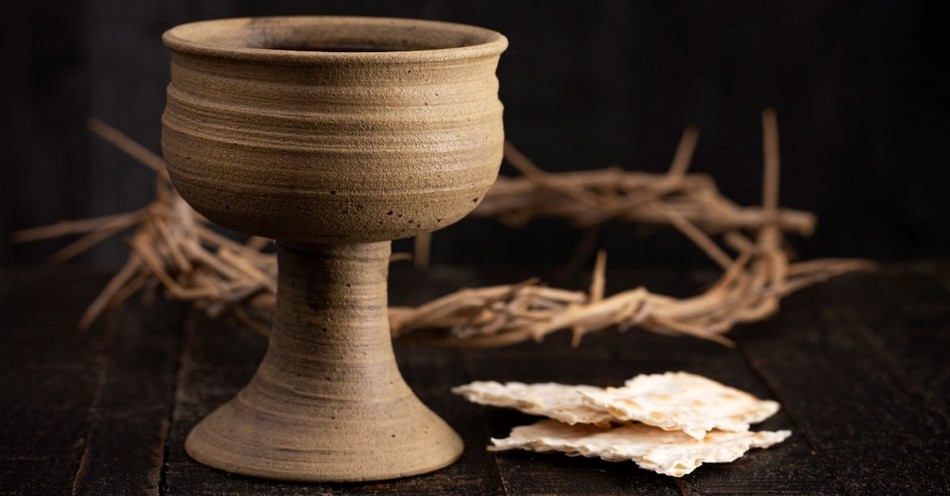Many Christians have an uneasy relationship with the Lord’s Supper. Though this gospel feast has been central to Christian worship since the beginning of the church, many believers find the Lord’s Supper either confusing, intimidating, or just plain boring.
I was raised in a tradition that observed the Lord’s Supper only twice a year, complete with unleavened bread and alcoholic wine. These biannual services were usually very solemn, and though they prompted serious self-examination and genuine gratitude for the work of Christ, they also made me feel uncomfortable. It was rare for me to approach the Table with anything like celebratory joy or the expectation of receiving practical help for my Christian life.
Even in my early days as a pastor, I approached Communion Sundays with a certain dread. Though responsible to officiate the Table, I usually felt too unworthy to do it, and was haunted by 1 Corinthians 11:27: “Whoever, therefore, eats the bread or drinks the cup of the Lord in an unworthy manner will be guilty concerning the body and blood of the Lord.” Nor did I really understand how Communion could serve as a “means of grace” for believers.
But over the years, this has slowly changed.
For one thing, I now see what should have been obvious: that even on my best weeks, I’m never worthy to serve Communion. Or take it. Or proclaim the gospel itself, for that matter. But I’ve also begun to understand that my unworthiness is exactly the reason why I need the Lord’s Supper and that the Supper really is a means of grace, that is, a God-ordained sacrament through which God, by his Spirit, nourishes the hearts of his people with his renewing grace.
Let me further explain each of these realizations.
The Table as Medicine for Sin-sick Souls
First, let’s clear up this whole issue of eating and drinking in an “unworthy manner.” It’s true that Paul’s instruction includes this exhortation to self-examination. But this doesn’t mean that believers must always have their act together in order to take Communion.
In context, Paul was addressing a nasty division within the Corinthian church. The “haves” were abusing their feasts by overindulgence (v. 21), even drinking to the point of drunkenness.[1] This excess was made even worse by their neglect of the “have not’s,” the poor who were left hungry while the wealthy feasted. Far from fostering unity around the Table, their behavior was a practical denial of the gospel.
Paul was addressing this situation when he warned about eating and drinking in an unworthy manner. While we should certainly check ourselves for divisive attitudes and practices before coming to the Table, this doesn’t mean you can’t take Communion if you yelled at your kids on the way to church. In fact, your ongoing battle with sin is one reason why you need the Table.
John Calvin, one of the best guides to troubled souls when it comes to the Lord’s Supper, helped me understand this. He said,
When we feel within us a strong distaste and hatred of all vices, proceeding from the fear of God, and a desire to live well in order to please our Lord, we are fit to partake of the Supper, notwithstanding the vestiges of infirmity which we carry in our flesh.
Calvin helpfully compared the elements of the Table to medicine that the Lord provides for the healing of sick souls.
Since then it is a remedy which God has given us to assist our frailty, to fortify our faith, to augment our charity, and to further us in all sanctity of life, so far from this making us abstain, we ought the more to make use of it, the more we feel oppressed by the disease.[2]
In other words, when we decline the elements because “we are still weak in faith or in integrity of life,” we are like convalescents refusing to take medicine because they are too sick! The Table is medicine for sin-sick souls, a strengthening cordial for weary, struggling, still imperfect, sometimes un-saintly saints.
“This then,” says Calvin, “is how the frailty of the faith which we feel in our heart, and the imperfections which persist in our life, ought to incite us to come to the Supper, as to a remedy designed to correct them. Only let us not come without faith or repentance.”
The Table as a Means of Grace
I’ve also come to better understand how the Table is a means of grace. This doesn’t refer to any supernatural change in the substance of the bread and wine itself. The elements do not work like magic. So do they merely jog one’s memory, benefiting us only by reminding us of what Jesus has done for us on the Cross? And, if so, is Communion really that important? After all, I can remember Jesus while strolling the beach, or playing golf, or enjoying a sunset in the mountains.
I’ve again found help from Calvin, but rather than quoting him again, allow me to paraphrase. The function of the Table runs parallel with the other primary means of grace, the Word of God. The Word holds forth the saving gospel of the crucified and risen Christ. But Scripture by itself is never sufficient to save. The Spirit must accompany the Word to make it effectual. “Our gospel came to you not only in word, but also in power and in the Holy Spirit and with full conviction.” (1 Thessalonians 1:5). The Word is like the sun, giving light to all. But in order to see the light of the sun, you must have the faculty of sight. But the sun cannot give sight to the blind. In the same way, the Word gives light, but only the Spirit gives us eyes to see.
The Table works in a similar way. The Word declares the good news for our hearing. It is the gospel made audible. But the Table displays the gospel to our eyes, hands, and mouths. It is the gospel made visible and tangible. At the Table, we taste and see that the Lord is good.[3] But the bread and wine do not benefit us by themselves anymore than the Word will benefit us by itself. To participate in Christ’s body and blood (1 Corinthians 10:16), we need the Holy Spirit. The Spirit gives us eyes to see, minds to understand, and faith to feast on the broken body and shed blood of Christ.
Appreciation and Appetite
This theology of the Lord’s Supper has helped me grow in both my appreciation and my appetite for the Table. Our church now observes the Table twice a month and I find myself eagerly anticipating these joyful celebrations of the gospel with my brothers and sisters in Christ.
I still feel unworthy to administer the Sacraments. But as my friend, Jeremiah Bass, has said, “When we partake of the Lord's Supper, we are not coming to a Table to put something on it, but to take something from it. The message of Communion is not that we are to make ourselves worthy but that Someone Else has been worthy for us.”[4]
The truth is that I’m not worthy and never will be. But the Table points me to the worth of Christ, whose death covers my sins, whose righteousness is counted mine, and whose Spirit continues to make me clean and new.
This is medicine, indeed. But this medicine actually tastes good.
Brian G. Hedges is the lead pastor for Fulkerson Park Baptist Church and the author of Christ Formed in You: The Power of the Gospel for Personal Change and Licensed to Kill: A Field Manual for Mortifying Sin. Brian and his wife Holly have four children and live in South Bend, Indiana.
End Notes
[1]This is a strong indication, by the way, that there were drinking fermented wine.
[2]John Calvin, Short Treatise on the Holy Supper of Our Lord and Only Savior Jesus Christ. In Calvin: Theological Treatises, edited by J. K. S. Reid. (Philadelphia: Westminster, 1954) pp. 152-153.
[3]In Calvin’s own words, “Faith is the proper and entire work of the Holy Spirit, illumined by whom we recognize God and the treasures of his kindness, and without whose light our mind is so blinded that it can see nothing; so dull that it can sense nothing of spiritual things…For first, the Lord teaches and instructs us by his Word. Secondly, he confirms it by the sacraments. Finally, he illumines our minds by the light of his Holy Spirit and opens our hearts for the Word and sacrament to enter in, which would otherwise only strike our ears and appear before our eyes, but not at all affect us within.” Institutes of the Christian Religion. 4.14.8. Edited by John T. McNeil. Translated by Ford L. Battles (Philadelphia: Westminster, 1960) p. 1284.
[4]Jeremiah Bass, “Coming to the Lord’s Table” https://space-fillingthoughts.blogspot.com/2013/02/coming-to-lords-table.html
Photo Credit: © Getty Images/pamela_d_mcadams
Learn more about the meaning and significance behind the Easter holiday and Holy Week celebrations:
What is Lent? and When Does Lent Start?
What is Ash Wednesday? and When is Ash Wednesday?
What is Palm Sunday?
What is Maundy Thursday?
What is Good Friday? and When is Good Friday?
What is Holy Saturday?
What is Easter? and When is Easter Sunday?
Easter Bible Verses
The Resurrection of Jesus
Easter Prayers



